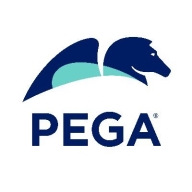

Pega Platform and TIBCO ActiveMatrix BPM are competing products in the business process management category. Data comparisons suggest Pega Platform may have an edge in feature richness, while TIBCO ActiveMatrix BPM is often valued for performance, scalability, and integration.
Features: Pega Platform offers robust automation capabilities, adaptive analytics, and comprehensive case management with AI integration. It is known for its advanced analytics and decisioning features. TIBCO ActiveMatrix BPM provides high scalability and seamless integration with diverse systems, focusing on operational flexibility and strong performance integrations.
Room for Improvement: Pega Platform could improve on its initial complexity which can be challenging for new users. Some users feel upgrades from older versions require significant work. Its interface, while powerful, may overwhelm users unfamiliar with its breadth of features. TIBCO ActiveMatrix BPM, while highly scalable, could benefit from simplifying on-premise deployments. It might enhance its user interface to compete more directly with modern BPM solutions and provide faster integration adaptations for new technologies.
Ease of Deployment and Customer Service: Pega Platform is recognized for its flexible cloud-based deployment options and effective customer service that supports rapid implementation. Its deployment process is often smoother. TIBCO ActiveMatrix BPM offers robust on-premise deployment with reliable support. However, its setup can be more complex, although it provides stronger infrastructure support during the deployment phase.
Pricing and ROI: Pega Platform generally has a higher initial setup cost but suggests potential for significant ROI, which may justify the investment due to its comprehensive feature set. TIBCO ActiveMatrix BPM typically provides competitive pricing with moderate initial costs, though the ROI tends to be gradual and depends on specific use cases. While Pega's greater upfront cost might yield superior long-term returns, TIBCO offers a more cost-effective entry point.


Pega Platform facilitates business process management, case management, and workflow automation for industries like banking, insurance, and healthcare. It supports digital transformation and customer service enhancements with its low-code capabilities and seamless integrations.
Pega Platform enables users to create efficient systems for case management, financial operations, and digital transformations. It provides tools for client onboarding, quoting, claims processing, customer experience improvements, and content management. Pega's low-code approach allows for the automation of complex processes, making it suitable for enterprises looking for adaptability and rapid deployment. While it offers strong real-time analytics and decision automation, users acknowledge challenges in user interface, integration, and performance aspects. High costs and a learning curve need attention, and enhancements in AI features and cloud services are desired.
What are the key features of Pega Platform?In banking, Pega Platform automates loan processing, accelerates customer onboarding, and manages compliance. Insurance companies benefit from streamlined claims processing and policy management. Healthcare sectors use the platform for patient engagement and care coordination, enabling organizations to adapt quickly to changing industry requirements.
We monitor all Business Process Management (BPM) reviews to prevent fraudulent reviews and keep review quality high. We do not post reviews by company employees or direct competitors. We validate each review for authenticity via cross-reference with LinkedIn, and personal follow-up with the reviewer when necessary.